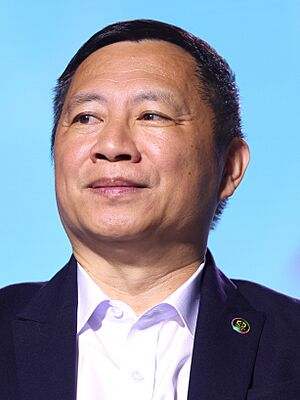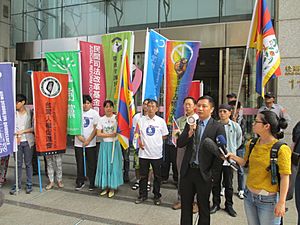Wang Dan (dissident) facts for kids
Quick facts for kids
Wang Dan
|
|||||||||||||||||
|---|---|---|---|---|---|---|---|---|---|---|---|---|---|---|---|---|---|

Wang Dan in 2025
|
|||||||||||||||||
| Born | 26 February 1969 Beijing, China
|
||||||||||||||||
| Education | |||||||||||||||||
| Chinese name | |||||||||||||||||
| Chinese | 王丹 | ||||||||||||||||
|
|||||||||||||||||
| Signature | |||||||||||||||||
 |
|||||||||||||||||
Wang Dan (Chinese: 王丹; born on February 26, 1969) is a Chinese activist. He is known for being a leader in the Chinese democracy movement. He was one of the most well-known student leaders during the Tiananmen Square protests of 1989.
Wang Dan earned a PhD in history from Harvard University. He has taught history at universities in Taiwan, including National Chengchi University and National Tsing Hua University. He also works to promote democracy in China. He travels to meet with Chinese people living outside China and with others around the world to gain support for his cause.
Contents
Biography
Wang Dan was born in 1969. He was a student at Peking University where he studied history. He was very active in politics and organized "Democracy Salons" at his school. These were like discussion groups about democracy.
When the student movement began in 1989, Wang Dan became a representative for Peking University. He helped organize the protests that took place in Tiananmen Square. After the protests, he was put on a list of 21 "most wanted" student leaders. Wang Dan tried to hide, but he was arrested on July 2, 1989. In 1991, he was sentenced to four years in prison.
Life After Prison
Wang Dan was released from prison in 1993. He continued to write articles for newspapers and magazines outside of mainland China. Because of this, he was arrested again in 1995. He was accused of trying to overthrow the Chinese Communist Party. In 1996, he was sentenced to 11 years in prison. However, he was released early in 1998 and sent to the United States of America.
In the United States, Wang Dan continued his studies at Harvard University. He earned his master's degree in East Asian history in 2001 and his PhD in 2008. He also did research on how democracy developed in Taiwan while at Oxford University in 2009. Today, he is the chairman of the Chinese Constitutional Reform Association. This group works on ideas for how China's government could change.
Wang Dan has appeared in documentaries about the Tiananmen Square protests, such as The Beijing Crackdown and Moving the Mountain. He was also mentioned in a book called Almost a Revolution.
Wang Dan was not allowed to return to mainland China. His passport expired in 2003. He tried to visit Hong Kong in 2004 but was not allowed in. In 2012, he finally landed in Hong Kong during a typhoon, but he had to stay in the airport because he did not have a visa.
Time in Prison
After the government stopped the protests in Tiananmen Square, Wang Dan was on a list of the 21 most wanted student leaders. He was put in prison on July 2, 1989. He stayed in jail for almost two years before his trial in 1991. Wang Dan was accused of spreading ideas against the government. He was sentenced to four years in prison. This was a shorter sentence compared to what some other political prisoners received. This might have been because the government was unsure what to do with so many students, and they felt pressure because Wang Dan was so well-known.
While in prison, Wang Dan spent two years at Qincheng Prison. This prison is known for holding many political prisoners. Even though cells were usually crowded, Wang Dan had his own cell because of his important case.
Wang Dan was released in 1993, a few months before his sentence was supposed to end. He believed this was likely connected to China's first attempt to host the Olympic Games. He and 19 other political prisoners were released just a month before the International Olympic Committee was set to visit.
Soon after his release in 1993, Wang Dan started promoting democracy in China again. He also contacted other activists who had left China and were living in the United States. He was arrested a second time in May 1995. This was two months after he gave an interview to a US magazine. In that interview, he said that people should work to build a "civil society" by focusing on social movements, not just political ones. Wang Dan was held for 17 months before being charged with "plotting to overthrow the government." He was then sentenced to 11 years in prison.
Instead of serving his full sentence, he was released in 1998 for "medical reasons." He was immediately sent to the United States. There, he was checked in a hospital and then allowed to live in the US as an exiled political activist. His release and move to the United States happened after an agreement between the US and China. The US stopped supporting a resolution that criticized China at the United Nations Commission on Human Rights. In return, China released political prisoners like Wang Dan.
Living in the United States
After arriving in the United States, Wang Dan continued to speak out about the Chinese government. He believes that the Chinese Communist Party needs to change. In an interview, he said that for democracy to grow in China, the country needs independent thinkers and independent people in business.
Wang Dan earned his PhD from Harvard University in 2008. He continues to work actively for change in China. He has written articles like "20 years after Tiananmen," which looks at how economic changes have affected Chinese people and suggests changes for human rights. He also wrote "Rebuild China with an Olympic Amnesty" after he arrived in the United States. In this article, he hoped that big international events like the Olympic Games could bring attention to human rights issues in China. In 2007, Wang Dan's second prison sentence officially ended. His release certificate was given to his parents on October 2, 2007.
Activism and Teaching
Wang Dan has been very active since his release from China. He has published articles and given many public interviews. Being in the United States allowed him to finish his education at Harvard University. He also became the chairman of the Chinese Constitutional Reform Association.
From 2010 to 2015, Wang Dan taught history at National Tsing Hua University in Hsinchu, Taiwan. In November 2010, while he was teaching a class, a woman with a knife entered the room. She seemed to want to harm him. Wang Dan was able to take the knife away from her before she could hurt him. He said this was the first time he felt his life was in danger. The woman had reportedly been following him for three years.
Wang Dan has a Facebook page, which he hoped to use to talk with people in mainland China. He is also a member of the advisory board for WikiLeaks and serves on the board of trustees for the Committee for Freedom in Hong Kong Foundation (CFHK).
Zoom Incident
An online event hosted by Wang Dan on Zoom in the United States was stopped on June 3, 2020. His Zoom account was blocked. This led to US lawmakers asking Zoom Video Communications to explain their connection with China regarding freedom of speech. Zoom apologized. They explained that they were confused by requests from China to block the event. They promised not to block events outside of China again.
Political Ideas
Looking Back at Tiananmen
Wang Dan has thought a lot about the Tiananmen movement. He has talked about things that could have been done differently. In an interview in 1989, he said that future student movements should be based on clear goals, like making campus life more democratic or ensuring civil rights. He also felt that important thinkers should have been involved earlier in the movement.
Even with its challenges, Wang Dan believes the protests changed how many Chinese people thought. He argued that the hunger strike was important because it brought more attention to the movement. He also feels that the government's actions and the focus on democracy helped educate people across the nation about democracy, which was a new idea for many.
Views on Democracy
Wang Dan has said that people wanting to become wealthy can help push for democracy. He believed that the Tiananmen Square movement was not ready for workers to join because democracy needed to be understood by students and thinkers first, before they could share it with others.
On China's Economy
In 2009, Wang Dan spoke about the idea that "for economic improvement, everything can be done, even killing people." He said that this idea shows that the "Tiananmen Massacre is still going on, only in different ways." He meant that in 1989, students' lives were taken, but now, the world's way of thinking is being harmed.
Views on US Politics
Wang Dan has expressed his views on US politics. He has said that the Democratic Party is "weak" when it comes to dealing with China. After Joe Biden won the 2020 elections, Wang Dan said he wanted to wait before recognizing Biden as president-elect. He also criticized the media for "biased reporting." He said about Biden's policies toward China:
For Biden’s policies toward China, the part about making China play by the international rules, I think, is very hollow. As we know, the Chinese Communist Party hardly abides by international rules. The United States must realize that there will be no improvements on human rights issues in China if there is no regime change.
See also
 In Spanish: Wang Dan para niños
In Spanish: Wang Dan para niños
- List of Chinese dissidents
 | Jackie Robinson |
 | Jack Johnson |
 | Althea Gibson |
 | Arthur Ashe |
 | Muhammad Ali |


